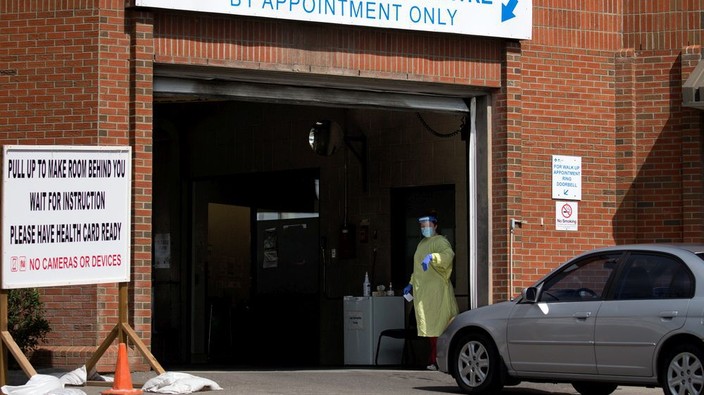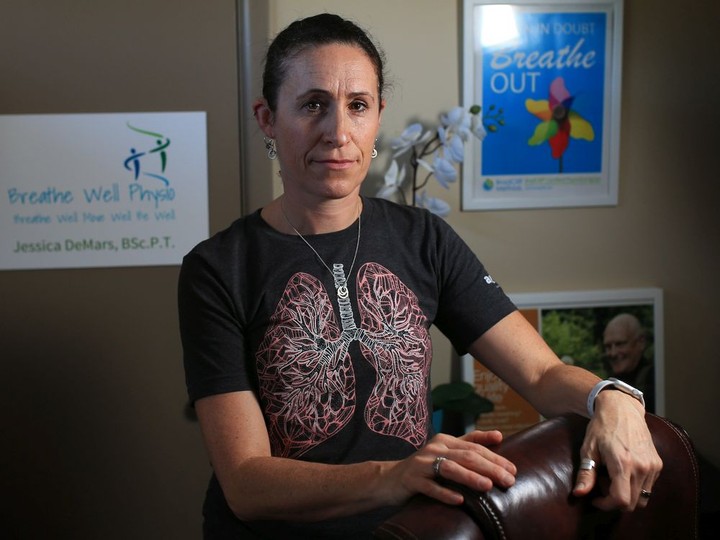alberta launches survey to discover true impact of 'long covid'
studies from other jurisdictions found long covid symptoms can persist for as long as six months after initial diagnosis with covid-19

cars are directed into the drive-thru covid-19 testing centre at the richmond road diagnostic and treatment centre in calgary on tuesday, august 24, 2021.
gavin young/postmedia
by: jason herringmany albertans who tested positive for covid-19 at some point during the pandemic can expect to receive an alberta health services survey soon, asking them about lingering symptoms of the virus.it’s an attempt by the provincial health authority to quantify the nebulous impact of “long covid” — a condition that can afflict people for weeks or even months after they test positive for the novel coronavirus. common symptoms include profound fatigue, brain fog, pain and shortness of breath.dr. chester ho with ahs said the survey is receiving final approvals, but will likely be sent out next month.“it will be a very large survey for our province, and it will be the very first time that we actually may have some understanding within alberta for how much albertans have been affected by covid and post-covid symptoms,” said ho, who has led work on long covid as the senior medical director of the ahs neurosciences, rehabilitation and vision team.“i really encourage everyone who receives the invitation to participate in the survey to respond, because it won’t just be helping ahs but it will be helping other albertans with covid and post-covid problems, as well as front-line clinical staff to understand what we’re dealing with. it’s going to be very helpful to everybody.”data from alberta is not yet available, ho explained, but studies from other jurisdictions found long-covid symptoms can persist for as long as six months after initial diagnosis with covid-19, and up to a quarter of people who test positive for the virus go on to develop these prolonged symptoms.
advertisement

alberta workers’ compensation board statistics give a sense of the scope of the issue in the province. data through the end of april 2021 showed the wcb accepted 8,288 claims for workers who got covid-19 in the course of their employment, with 11 per cent of those people missing more than 21 days of work.calgary respiratory physiotherapist jessica demars has been treating long-covid patients since fall 2020 as part of her breathe well physio practice. she said it will be nice to have official local statistics, but the information comes at a late stage in the pandemic.“the data is out there. i don’t think albertans are going to be any different than anywhere else in the world where they have already done surveys and studies about what people are experiencing,” demars said.“the focus on this point needs to be finding out what’s going on from a biomedical perspective and going from there … i’m glad it’s being done, i just wish we were further along.”

ho said ahs offers a series of resources for people with long covid. online resources are accessible at myhealth.alberta.ca/healthtopics/after-covid for those with more mild illness who can self-manage their symptoms.as well, the health authority runs four “covid-19 recovery clinics,” with two locations in calgary and two in edmonton. these clinics treat patients with serious, sometimes debilitating complications from covid-19 and are accessible only via referral from a primary-care doctor. they have seen considerable uptake, ho said, with upwards of 500 referrals to the kaye edmonton clinic.long-term complications of covid-19 affect a wide swath of people, including young people and those who did not have severe illness from the virus, ho explained.“this is affecting everybody… it can affect people who were initially infected and were not that sick. they did not go to the hospital, and they still get these post-covid symptoms later on,” he said.“it’s important for people to understand it’s affecting anyone who got covid.”ho added vaccinations lower the risk of getting covid-19, and therefore lowers the risk of developing long-covid symptoms.people with long-term covid symptoms need to be provided information about management of their illness and what they should and should not do, demars said.“you can’t push it, you can’t exercise your way out of this, you can’t work your way out of this,” she said.“people are still trying to function because they have to work, they have to take care of their families, but unfortunately these are the things that make them worse, and we don’t have supports in place for that.”jherring@postmedia.comtwitter:@jasonfherring
 3 minute read
3 minute read





